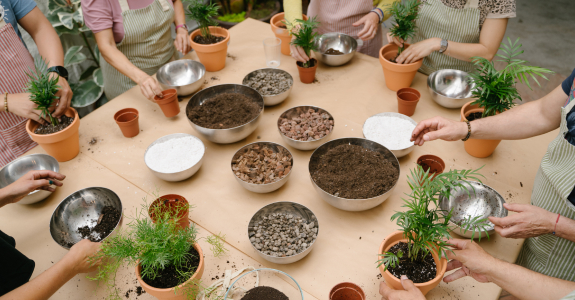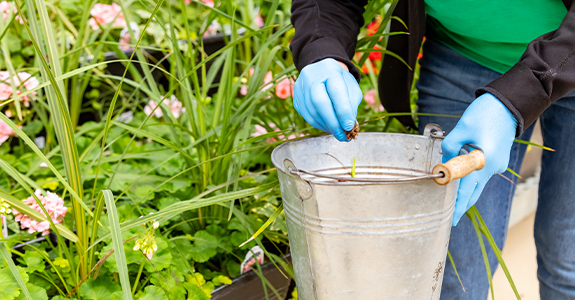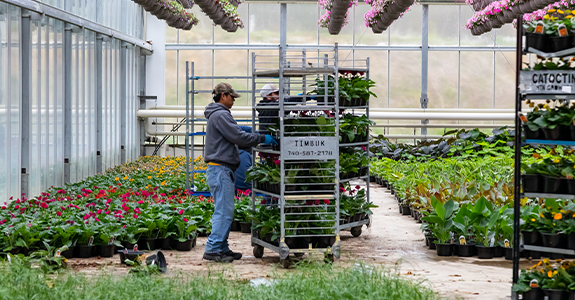Promote plants that cultivate positive mental health

In today’s complex environment, where mental health challenges affect an estimated 50% of adults worldwide, there’s an increased opportunity for businesses like yours to harness the positive impact of plants and flowers on emotional well-being.
Meeting the increasing demand for mental health solutions becomes not just a service but a strategic advantage, helping enhance both the well-being of your customers and gain exposure for your business.
Let’s dive into strategies for incorporating wellness into your retail offerings.
Benefits of houseplants in relation to well-being
Selecting the perfect plants for your customers goes beyond the foliage. Understand their preferences, living spaces, and goals to offer practical, natural solutions that contribute to their well-being. It’s more than just selling plants—it’s about providing valuable choices that can make a positive impact on their daily lives.
Create a therapeutic shopping environment
Getting in touch with nature isn’t just a mood lifter—it can supercharge your overall happiness. Help your customers experience the mood-lifting benefits of plants and flowers by enhancing areas in your retail space:
Optimize the ambiance with soft lighting instead of harsh fluorescent overheads.
Create a relaxation niche featuring nature soundscapes to enhance tranquility. Incorporate water features, stones, and wood for a natural oasis.
Provide seating areas where shoppers can relax amidst the greenery. This facilitates longer stays and nurtures a stronger connection between your customers and your inventory.
We offer a wide variety of loss control and safety resource materials tailored to horticultural industry businesses.
Customer engagement and education
Empower your customers by educating them about the positive emotional impact of plants and flowers. This not only deepens their appreciation for your products but also positions your brand as a leader in providing meaningful and enriching experiences.
Consider incorporating these strategies into your customer outreach:

Host educational workshops and webinars that explore the emotional benefits of plants and flowers. Invite experts to share their knowledge and provide hands-on demonstrations, allowing customers to learn how to incorporate plants into their lives for enhanced well-being.

Launch interactive social media campaigns that encourage customers to share their own experiences with plants and flowers, fostering a community where individuals can exchange insights, tips, and personal stories about the benefits they've discovered.

Enrich your customer's understanding of plants and their positive impact by sharing informative resources like research findings, success stories, and expert tips on the healing power of specific plants.
Marketing your plant and flower health benefits
Emphasizing the mental health advantages of plants and flowers in your marketing activity offers numerous benefits, including enhancing customer engagement and satisfaction, elevating brand reputation, boosting sales, and cultivating customer loyalty. Here are a few strategies to consider:

Promote a social media campaign that features images of people relaxing in their homes surrounded by plants, with a tagline along the lines of “Plants for a happy home.”

Create a marketing campaign that features images of people gardening outdoors, with the tagline: Get healthy with gardening.

Offer a variety of affordable plants and subscriptions. Publish a blog that features articles on the mental health benefits of your offerings.

Show off eye-catching, in-store signs with messages like “Plants grow happiness” or “Nurture your mind and body,” making it clear you value your customers’ well-being.

Send monthly email newsletters with ideas, inspirational quotes, or do-it-yourself projects related to cultivating inner peace through plants.

Partner with mental health and wellness organizations to promote therapeutic horticulture and provide your educational materials in their spaces.
Foster wellness with your personalized products
By carefully choosing plants with mood-enhancing properties, designing therapeutic spaces, engaging customers through education, and effectively marketing these benefits, you can help cultivate a happier, healthier community and drive sales.
As you expand your wellness offerings, don’t overlook your business insurance to help ensure you’re properly covered. Niche providers like Hortica®—a brand of the Sentry Insurance Group—can tailor a plan that fits your operations today, with an eye toward the future.

Flower shop insurance explained: What business insurance do florists need?

How to file a florist insurance claim: A step-by-step guide

Understanding horticulture and floriculture—and why specialized insurance matters
The information in this article is for informational or entertainment purposes only. View our disclaimer by going to terms and conditions and clicking on Learning Center disclaimer in the table of contents.



